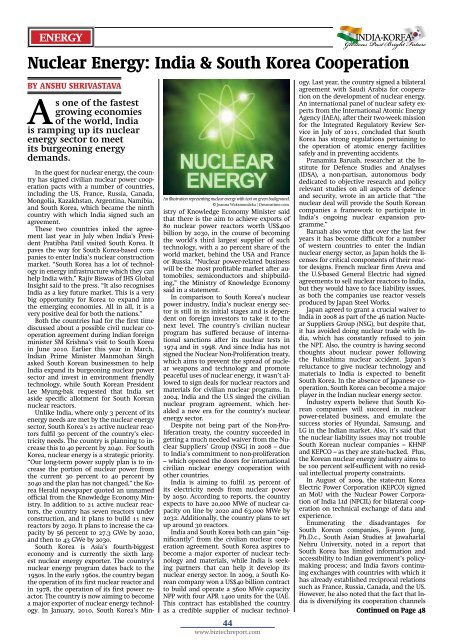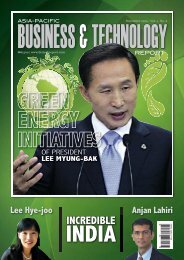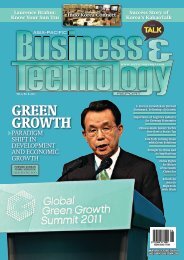INDIA-KOREA - Asia-Pacific Business and Technology Report
INDIA-KOREA - Asia-Pacific Business and Technology Report
INDIA-KOREA - Asia-Pacific Business and Technology Report
You also want an ePaper? Increase the reach of your titles
YUMPU automatically turns print PDFs into web optimized ePapers that Google loves.
ENERGY<br />
by Anshu Shrivastava<br />
As one of the fastest<br />
growing economies<br />
of the world, India<br />
is ramping up its nuclear<br />
energy sector to meet<br />
its burgeoning energy<br />
dem<strong>and</strong>s.<br />
An illustration representing nuclear energy with text on green background.<br />
© Joanna Waksmundzka | Dreamstime.com<br />
<strong>INDIA</strong>-<strong>KOREA</strong><br />
Glorious Past Bright Future<br />
Nuclear Energy: India & South Korea Cooperation<br />
In the quest for nuclear energy, the country<br />
has signed civilian nuclear power cooperation<br />
pacts with a number of countries,<br />
including the US, France, Russia, Canada,<br />
Mongolia, Kazakhstan, Argentina, Namibia,<br />
<strong>and</strong> South Korea, which became the ninth<br />
country with which India signed such an<br />
agreement.<br />
These two countries inked the agreement<br />
last year in July when India’s President<br />
Pratibha Patil visited South Korea. It<br />
paves the way for South Korea-based companies<br />
to enter India’s nuclear construction<br />
market. “South Korea has a lot of technology<br />
in energy infrastructure which they can<br />
help India with,” Rajiv Biswas of IHS Global<br />
Insight said to the press. “It also recognises<br />
India as a key future market. This is a very<br />
big opportunity for Korea to exp<strong>and</strong> into<br />
the emerging economies. All in all, it is a<br />
very positive deal for both the nations.”<br />
Both the countries had for the first time<br />
discussed about a possible civil nuclear cooperation<br />
agreement during Indian foreign<br />
minister SM Krishna’s visit to South Korea<br />
in June 2010. Earlier this year in March,<br />
Indian Prime Minister Manmohan Singh<br />
asked South Korean businessmen to help<br />
India exp<strong>and</strong> its burgeoning nuclear power<br />
sector <strong>and</strong> invest in environment friendly<br />
technology, while South Korean President<br />
Lee Myung-bak requested that India set<br />
aside specific allotment for South Korean<br />
nuclear reactors.<br />
Unlike India, where only 3 percent of its<br />
energy needs are met by the nuclear energy<br />
sector, South Korea’s 21 active nuclear reactors<br />
fulfil 30 percent of the country’s electricity<br />
needs. The country is planning to increase<br />
this to 40 percent by 2040. For South<br />
Korea, nuclear energy is a strategic priority.<br />
“Our long-term power supply plan is to increase<br />
the portion of nuclear power from<br />
the current 30 percent to 40 percent by<br />
2040 <strong>and</strong> the plan has not changed,” the Korea<br />
Herald newspaper quoted an unnamed<br />
official from the Knowledge Economy Ministry.<br />
In addition to 21 active nuclear reactors,<br />
the country has seven reactors under<br />
construction, <strong>and</strong> it plans to build 11 new<br />
reactors by 2030. It plans to increase the capacity<br />
by 56 percent to 27.3 GWe by 2020,<br />
<strong>and</strong> then to 43 GWe by 2030.<br />
South Korea is <strong>Asia</strong>’s fourth-biggest<br />
economy <strong>and</strong> is currently the sixth largest<br />
nuclear energy exporter. The country’s<br />
nuclear energy program dates back to the<br />
1950s. In the early 1960s, the country began<br />
the operation of its first nuclear reactor <strong>and</strong><br />
in 1978, the operation of its first power reactor.<br />
The country is now aiming to become<br />
a major exporter of nuclear energy technology.<br />
In January, 2010, South Korea’s Ministry<br />
of Knowledge Economy Minister said<br />
that there is the aim to achieve exports of<br />
80 nuclear power reactors worth US$400<br />
billion by 2030, in the course of becoming<br />
the world’s third largest supplier of such<br />
technology, with a 20 percent share of the<br />
world market, behind the USA <strong>and</strong> France<br />
or Russia. “Nuclear power-related business<br />
will be the most profitable market after automobiles,<br />
semiconductors <strong>and</strong> shipbuilding,”<br />
the Ministry of Knowledge Economy<br />
said in a statement.<br />
In comparison to South Korea’s nuclear<br />
power industry, India’s nuclear energy sector<br />
is still in its initial stages <strong>and</strong> is dependent<br />
on foreign investors to take it to the<br />
next level. The country’s civilian nuclear<br />
program has suffered because of international<br />
sanctions after its nuclear tests in<br />
1974 <strong>and</strong> in 1998. And since India has not<br />
signed the Nuclear Non-Proliferation treaty,<br />
which aims to prevent the spread of nuclear<br />
weapons <strong>and</strong> technology <strong>and</strong> promote<br />
peaceful uses of nuclear energy, it wasn’t allowed<br />
to sign deals for nuclear reactors <strong>and</strong><br />
materials for civilian nuclear programs. In<br />
2004, India <strong>and</strong> the U.S singed the civilian<br />
nuclear program agreement, which heralded<br />
a new era for the country’s nuclear<br />
energy sector.<br />
Despite not being part of the Non-Proliferation<br />
treaty, the country succeeded in<br />
getting a much needed waiver from the Nuclear<br />
Suppliers’ Group (NSG) in 2008 – due<br />
to India’s commitment to non-proliferation<br />
– which opened the doors for international<br />
civilian nuclear energy cooperation with<br />
other countries.<br />
India is aiming to fulfil 25 percent of<br />
its electricity needs from nuclear power<br />
by 2050. According to reports, the country<br />
expects to have 20,000 MWe of nuclear capacity<br />
on line by 2020 <strong>and</strong> 63,000 MWe by<br />
2032. Additionally, the country plans to set<br />
up around 30 reactors.<br />
India <strong>and</strong> South Korea both can gain “significantly”<br />
from the civilian nuclear cooperation<br />
agreement. South Korea aspires to<br />
become a major exporter of nuclear technology<br />
<strong>and</strong> materials, while India is seeking<br />
partners that can help it develop its<br />
nuclear energy sector. In 2009, a South Korean<br />
company won a US$40 billion contract<br />
to build <strong>and</strong> operate a 5600 MWe capacity<br />
NPP with four APR 1400 units for the UAE.<br />
This contract has established the country<br />
as a credible supplier of nuclear technol-<br />
44<br />
www.biztechreport.com<br />
ogy. Last year, the country signed a bilateral<br />
agreement with Saudi Arabia for cooperation<br />
on the development of nuclear energy.<br />
An international panel of nuclear safety experts<br />
from the International Atomic Energy<br />
Agency (IAEA), after their two-week mission<br />
for the Integrated Regulatory Review Service<br />
in July of 2011, concluded that South<br />
Korea has strong regulations pertaining to<br />
the operation of atomic energy facilities<br />
safely <strong>and</strong> in preventing accidents.<br />
Pranamita Baruah, researcher at the Institute<br />
for Defence Studies <strong>and</strong> Analyses<br />
(IDSA), a non-partisan, autonomous body<br />
dedicated to objective research <strong>and</strong> policy<br />
relevant studies on all aspects of defence<br />
<strong>and</strong> security, wrote in an article that “the<br />
nuclear deal will provide the South Korean<br />
companies a framework to participate in<br />
India’s ongoing nuclear expansion programme.”<br />
Baruah also wrote that over the last few<br />
years it has become difficult for a number<br />
of western countries to enter the Indian<br />
nuclear energy sector, as Japan holds the licenses<br />
for critical components of their reactor<br />
designs. French nuclear firm Areva <strong>and</strong><br />
the U.S-based General Electric had signed<br />
agreements to sell nuclear reactors to India,<br />
but they would have to face liability issues,<br />
as both the companies use reactor vessels<br />
produced by Japan Steel Works.<br />
Japan agreed to grant a crucial waiver to<br />
India in 2008 as part of the 46 nation Nuclear<br />
Suppliers Group (NSG), but despite that,<br />
it has avoided doing nuclear trade with India,<br />
which has constantly refused to join<br />
the NPT. Also, the country is having second<br />
thoughts about nuclear power following<br />
the Fukushima nuclear accident. Japan’s<br />
reluctance to give nuclear technology <strong>and</strong><br />
materials to India is expected to benefit<br />
South Korea. In the absence of Japanese cooperation,<br />
South Korea can become a major<br />
player in the Indian nuclear energy sector.<br />
Industry experts believe that South Korean<br />
companies will succeed in nuclear<br />
power-related business, <strong>and</strong> emulate the<br />
success stories of Hyundai, Samsung, <strong>and</strong><br />
LG in the Indian market. Also, it’s said that<br />
the nuclear liability issues may not trouble<br />
South Korean nuclear companies – KHNP<br />
<strong>and</strong> KEPCO – as they are state-backed. Plus,<br />
the Korean nuclear energy industry aims to<br />
be 100 percent self-sufficient with no residual<br />
intellectual property constraints.<br />
In August of 2009, the state-run Korea<br />
Electric Power Corporation (KEPCO) signed<br />
an MoU with the Nuclear Power Corporation<br />
of India Ltd (NPCIL) for bilateral cooperation<br />
on technical exchange of data <strong>and</strong><br />
experience.<br />
Enumerating the disadvantages for<br />
South Korean companies, Ji-yeon Jung,<br />
Ph.D.c., South <strong>Asia</strong>n Studies at Jawaharlal<br />
Nehru University, noted in a report that<br />
South Korea has limited information <strong>and</strong><br />
accessibility to Indian government’s policymaking<br />
process; <strong>and</strong> India favors continuing<br />
exchanges with countries with which it<br />
has already established reciprocal relations<br />
such as France, Russia, Canada, <strong>and</strong> the US.<br />
However, he also noted that the fact that India<br />
is diversifying its cooperation channels<br />
Continued on Page 48









